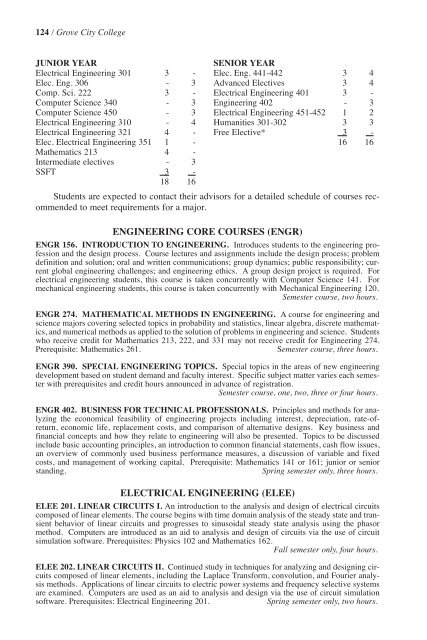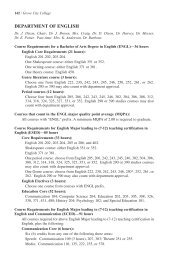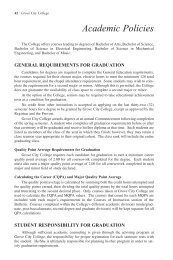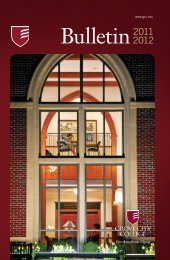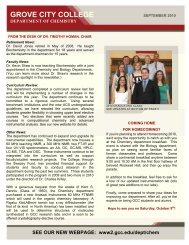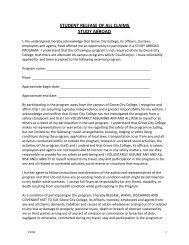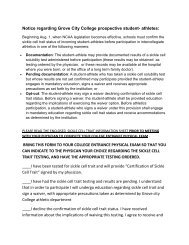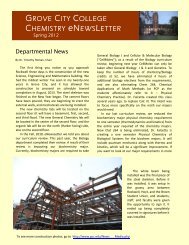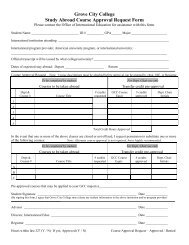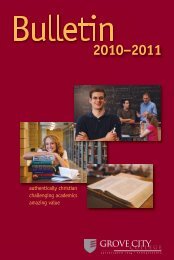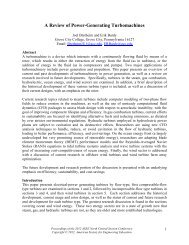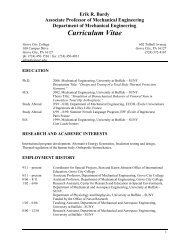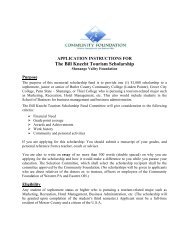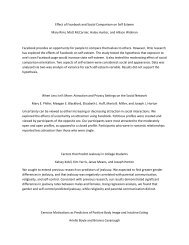2009–2010 - Grove City College
2009–2010 - Grove City College
2009–2010 - Grove City College
Create successful ePaper yourself
Turn your PDF publications into a flip-book with our unique Google optimized e-Paper software.
124 / <strong>Grove</strong> <strong>City</strong> <strong>College</strong><br />
JUNIOR YEAR SENIOR YEAR<br />
Electrical Engineering 301 3 - Elec. Eng. 441-442 3 4<br />
Elec. Eng. 306 - 3 Advanced Electives 3 4<br />
Comp. Sci. 222 3 - Electrical Engineering 401 3 -<br />
Computer Science 340 - 3 Engineering 402 - 3<br />
Computer Science 450 - 3 Electrical Engineering 451-452 1 2<br />
Electrical Engineering 310 - 4 Humanities 301-302 3 3<br />
Electrical Engineering 321 4 - Free Elective* 3 -<br />
Elec. Electrical Engineering 351 1 - 16 16<br />
Mathematics 213 4 -<br />
Intermediate electives - 3<br />
SSFT 3 -<br />
18 16<br />
Students are expected to contact their advisors for a detailed schedule of courses recommended<br />
to meet requirements for a major.<br />
ENGINEERING CORE COURSES (ENGR)<br />
ENGR 156. INTRODUCTION TO ENGINEERING. Introduces students to the engineering profession<br />
and the design process. Course lectures and assignments include the design process; problem<br />
definition and solution; oral and written communications; group dynamics; public responsibility; current<br />
global engineering challenges; and engineering ethics. A group design project is required. For<br />
electrical engineering students, this course is taken concurrently with Computer Science 141. For<br />
mechanical engineering students, this course is taken concurrently with Mechanical Engineering 120.<br />
Semester course, two hours.<br />
ENGR 274. MATHEMATICAL METHODS IN ENGINEERING. A course for engineering and<br />
science majors covering selected topics in probability and statistics, linear algebra, discrete mathematics,<br />
and numerical methods as applied to the solution of problems in engineering and science. Students<br />
who receive credit for Mathematics 213, 222, and 331 may not receive credit for Engineering 274.<br />
Prerequisite: Mathematics 261. Semester course, three hours.<br />
ENGR 390. SPECIAL ENGINEERING TOPICS. Special topics in the areas of new engineering<br />
development based on student demand and faculty interest. Specific subject matter varies each semester<br />
with prerequisites and credit hours announced in advance of registration.<br />
Semester course, one, two, three or four hours.<br />
ENGR 402. BUSINESS FOR TECHNICAL PROFESSIONALS. Principles and methods for analyzing<br />
the economical feasibility of engineering projects including interest, depreciation, rate-ofreturn,<br />
economic life, replacement costs, and comparison of alternative designs. Key business and<br />
financial concepts and how they relate to engineering will also be presented. Topics to be discussed<br />
include basic accounting principles, an introduction to common financial statements, cash flow issues,<br />
an overview of commonly used business performance measures, a discussion of variable and fixed<br />
costs, and management of working capital. Prerequisite: Mathematics 141 or 161; junior or senior<br />
standing. Spring semester only, three hours.<br />
ELECTRICAL ENGINEERING (ELEE)<br />
ELEE 201. LINEAR CIRCUITS I. An introduction to the analysis and design of electrical circuits<br />
composed of linear elements. The course begins with time domain analysis of the steady state and transient<br />
behavior of linear circuits and progresses to sinusoidal steady state analysis using the phasor<br />
method. Computers are introduced as an aid to analysis and design of circuits via the use of circuit<br />
simulation software. Prerequisites: Physics 102 and Mathematics 162.<br />
Fall semester only, four hours.<br />
ELEE 202. LINEAR CIRCUITS II. Continued study in techniques for analyzing and designing circuits<br />
composed of linear elements, including the Laplace Transform, convolution, and Fourier analysis<br />
methods. Applications of linear circuits to electric power systems and frequency selective systems<br />
are examined. Computers are used as an aid to analysis and design via the use of circuit simulation<br />
software. Prerequisites: Electrical Engineering 201. Spring semester only, two hours.


